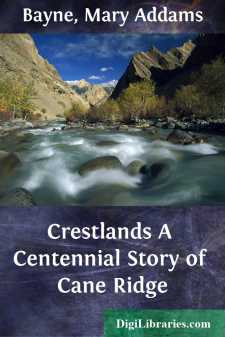Categories
- Antiques & Collectibles 13
- Architecture 36
- Art 48
- Bibles 22
- Biography & Autobiography 813
- Body, Mind & Spirit 142
- Business & Economics 28
- Children's Books 15
- Children's Fiction 12
- Computers 4
- Cooking 94
- Crafts & Hobbies 4
- Drama 346
- Education 46
- Family & Relationships 57
- Fiction 11828
- Games 19
- Gardening 17
- Health & Fitness 34
- History 1377
- House & Home 1
- Humor 147
- Juvenile Fiction 1873
- Juvenile Nonfiction 202
- Language Arts & Disciplines 88
- Law 16
- Literary Collections 686
- Literary Criticism 179
- Mathematics 13
- Medical 41
- Music 40
- Nature 179
- Non-Classifiable 1768
- Performing Arts 7
- Periodicals 1453
- Philosophy 64
- Photography 2
- Poetry 896
- Political Science 203
- Psychology 42
- Reference 154
- Religion 513
- Science 126
- Self-Help 84
- Social Science 81
- Sports & Recreation 34
- Study Aids 3
- Technology & Engineering 59
- Transportation 23
- Travel 463
- True Crime 29
Crestlands A Centennial Story of Cane Ridge
Description:
Excerpt
CHAPTER I.
THE COMING OF THE SCHOOLMASTER
The spirit of Indian Summer, enveloped in a delicate bluish haze, pervaded the Kentucky forest. Through the treetops sounded a sighing minor melody as now and then a leaf bade adieu to the companions of its summer revels, and sought its winter's rest on the ground beneath. On a fallen log a redbird sang with jubilant note. What cared he for the lament of the leaves? True, he must soon depart from this summer home; but only to wing his way to brighter skies, and then return when mating-time should come again. Near a group of hickory-trees a colony of squirrels gathered their winter store of nuts; and a flock of wild turkeys led by a pompous, bearded gobbler picked through the underbrush. At a wayside puddle a deer bent his head to slake his thirst, but scarcely had his lips touched the water when his head was reared again. For an instant he listened, limbs quivering, nostrils dilating, a startled light in his soft eyes; then with a bound he was away into the depths of the forest. The turkeys, heeding the tocsin of alarm from their leader, sought the shelter of the deeper undergrowth; the squirrels dropped their nuts and found refuge in the topmost branches of the tree which they had just pilfered; but the redbird, undisturbed, went on with his caroling, too confident in his own beauty and the charm of his song to fear any intruder.
The cause of alarm was a horseman whose approach had been proclaimed by the crackling of dried twigs in the bridle-path he was traversing. He was an erect, broad-shouldered, dark-eyed young man with ruddy complexion, clear-cut features, and a well-formed chin. A rifle lay across his saddle-bow, and behind him was a pair of bulky saddle-bags. He wore neither the uncouth garb of the hunter nor the plain homespun of the settler, but rather the dress of the Virginian cavalier of the period, although his hair, instead of being tied in a queue, was short, and curled loosely about his finely shaped head. The broad brim of his black hat was cocked in front by a silver boss; the gray traveler's cape, thrown back, revealed a coat of dark blue, a waistcoat ornamented with brass buttons, and breeches of the same color as the coat, reaching to the knees, and terminating in a black cloth band with silver buckles.
He rode rapidly along the well-defined bridle-way, and soon emerged into a broader thoroughfare. Presently he heard the high-pitched, quavering notes of a negro melody, faint at first and seeming as much a part of nature as the russet glint of the setting sun through the trees. The song grew louder as he advanced, until, emerging into an open space, he came upon the singer, a gray-haired negro trudging sturdily along with a stout hickory stick in his hand. The negro doffed his cap and bowed humbly.
"Marstah, hez you seed anythin' ob a spotted heifer wid one horn broke off, anywhars on de road? She's pushed down de bars an' jes' skipped off somewhars."
"No, uncle, I've met no stray cows; but can you tell me how far it is to Major Hiram Gilcrest's?...


